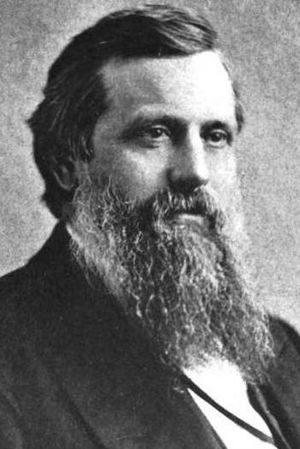John Eaton (educator) facts for kids
Quick facts for kids
John Eaton
|
|
|---|---|

Frontispiece of 1907's Grant, Lincoln, and the Freedmen: Reminiscences of the Civil War
|
|
| United States Commissioner of Education | |
| In office March 16, 1870 – August 5, 1886 |
|
| President | Ulysses Grant Rutherford Hayes James Garfield Chester Arthur Grover Cleveland |
| Preceded by | Henry Barnard |
| Succeeded by | Nathaniel Dawson |
| Personal details | |
| Born | December 5, 1829 Sutton, New Hampshire, U.S. |
| Died | February 9, 1906 (aged 76) Washington, D.C., U.S. |
| Education | Dartmouth College (BA) Rutgers University, New Brunswick (AM, LLD) |
| Signature | |
| Military service | |
| Allegiance | • Union |
| Branch/service | Union Army |
| Rank | |
| Unit | 27th Ohio Infantry |
| Commands | 63rd U.S. Colored Infantry |
| Battles/wars | American Civil War |
John Eaton, Jr. (born December 5, 1829 – died February 9, 1906) was an important American educator. He was also a brave soldier during the American Civil War. He became a Union Army Colonel and later a brevet Brigadier General. After the war, he became the U.S. Commissioner of Education, helping to improve schools across the country.
Contents
Early Life and Education
John Eaton, Jr. was born in Sutton, New Hampshire. He was the oldest of nine children. His father was a farmer. John went to Thetford Academy in Vermont.
He later attended Dartmouth College, graduating in 1854. To pay for his studies, he taught classes during all four years of college. After Dartmouth, he studied at Andover Theological Seminary. In 1862, he became a Presbyterian minister. He also earned advanced degrees from Rutgers University.
John Eaton's Career
Serving in the Civil War
When the American Civil War began, John Eaton joined the Union Army. He started as a chaplain for the 27th Ohio Volunteer Infantry in August 1861. A chaplain is a minister who serves with the military.
In November 1862, after President Lincoln's first Emancipation Proclamation, Eaton was given an important job. Major General Ulysses S. Grant asked him to oversee "freedmen." These were formerly enslaved people who had gained their freedom.
Eaton's role grew, and he supervised military posts from Cairo to Natchez. In November 1863, Grant made him the Superintendent of Negro Affairs for the Department of the Tennessee. In this role, Eaton helped set up 74 schools for freed people. He also became a colonel of the 63rd United States Colored Infantry in October 1863.
After the war, in 1866, President Andrew Johnson honored Eaton for his service. He was promoted to brevet brigadier general of volunteers.
After the War: A Focus on Education
After leaving the military, General Eaton returned to his passion: education. He continued to work with the Freedmen's Bureau until December 1865. This bureau helped formerly enslaved people adjust to their new lives.
In 1866, he became an editor for the Memphis Daily Post newspaper. From 1867 to 1869, he served as the state superintendent of schools in Tennessee.
In 1870, John Eaton was appointed the United States Commissioner of Education. He worked hard in the U.S. Bureau of Education. During his time, he helped organize the Board of Education in Washington, D.C. He also reorganized the Bureau of Refugees, Freedmen, and Abandoned Lands.
From 1886 to 1891, Eaton was the president of Marietta College. In 1895, he became president of Sheldon Jackson College in Sitka, Alaska. In 1898, he worked as an inspector of education in Puerto Rico. He played a key role in organizing Puerto Rico's school system. At the same time, he was president of Westminster College in Salt Lake City.
Eaton was also involved in many other important groups. He was a leader in public health, science, and social science organizations. He helped organize educational exhibits at big events like the Centennial Exposition and the New Orleans exposition. He also led national congresses on education and religious education.
John Eaton wrote several books and articles. These included a history of Thetford Academy, "Mormons of Today," and "The Freedmen in the War."
Personal Life and Legacy
John Eaton faced health challenges for several years. He passed away on February 9, 1906, in Washington, D.C.. He was buried at Arlington National Cemetery.
Four years after his death, a school was named in his honor. John Eaton Elementary School in Washington, D.C., remembers his contributions to education.
His daughter, Elsie Eaton Newton (1871–1941), also became an educator. She worked with the United States Indian Service. Later, she was the first Dean of Women at Marietta College.
See also
- List of American Civil War brevet generals (Union)
 | Anna J. Cooper |
 | Mary McLeod Bethune |
 | Lillie Mae Bradford |

